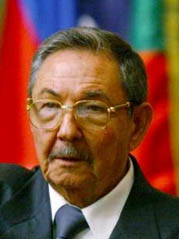HAVANA, (Reuters) – A sharp increase in customs duties has angered many Cubans and cast a shadow over market-oriented reforms on the communist-ruled island advocated by President Raul Castro.
The move, which raises fees many times over in some cases, is expected to ratchet up prices and decrease the availability of imported merchandise. It also threaten to bankrupt some of the tens of thousands of mom-and-pop businesses that have sprung up in recent years.
“After all the good things the Revolution has accomplished, it is a shame that they are now ruining the country and making people’s lives miserable,” said Carmen, a nurse who boosts her salary of 500 pesos per month by selling linens and towels from Ecuador and Miami.

Maria, who uses her Spanish passport to travel to the United States several times a year to buy goods for resale at her home in Santiago de Cuba, said the measure would make her family’s life much more difficult.
“”This always happens. Every time there is an opening for any kind of business they look for a way to close it,” she said in a telephone interview.
Since taking over for his ailing brother Fidel in 2008, Raul Castro has pushed for the “”modernization” of the state-monopolized economy, promoted small business and farming and lifted some onerous restrictions on daily life in the Caribbean nation.
The customs regime beginning in August appears headed in the opposite direction, protecting state-run “”dollar stores” from a growing flow of merchandise imported informally by small businesses and residents who hawk clothing and other items door to door.
Decrees establishing the duties were quietly published in the Official Gazette this month without explanation. The official media remained largely mum on the new duties until this week.
SHORT-SIGHTED
Economist Juan Triana, during his weekly Thursday spot on Cuba’s Radio Taino, termed the measure “short-sighted.
“”For a few months customs revenues may increase, but in the long-term I think they will decrease,” he said.
Triana said the new duties would “drastically reduce the availability of goods and increase prices for a population “that is already hard-pressed to make ends meet.
The new duties not only increase fees but also stipulate Cubans traveling abroad more than once a year will have to pay them in a local dollar equivalent called the Convertible Peso (CUC), worth 24 times the pesos they earn from the state.
“If you have to pay customs in CUCs you have to sell at a gold standard to make a profit. You are going to see even higher prices now,” said Carmen Perez, a woman in her 40s who sells odds and ends like batteries and minor plumbing fixtures, along with clothing, from her front door in a Havana neighborhood.
“This is going to affect us a lot because we are going to have to increase prices, and our clients aren’t rich, they are workers,” said Joel Hernandez, who sells clothing and other merchandise from his front yard near a state-run shopping center in Havana’s Vedado district.
One measure that takes effect next month slaps a 100-percent to 200-percent duty on all new electronic and other big-ticket items valued at more than $50, with the exception of medicines, regardless of whether they are brought in by Cubans, foreign residents or tourists.
Another steep duty applies to “”miscellaneous” goods shipped in through airports, ports and the mail by Cubans living at home or abroad, for example clothing, food, personal hygiene products, makeup and bedding.
A $4.50-per-pound duty goes into effect in September for all shipments weighing more than about seven pounds (3 kg), compared with the current equivalent of $0.25 per pound charged Cubans and the $2 that non-resident Cubans and foreigners pay.
The measure also applies to excess baggage at the airport.
MIAMI CONNECTION
Cubans, trapped in a state-run system that pays them in pesos and charges for imported goods in CUCs, have for years coordinated with family and friends abroad to bring in relatively small amounts of merchandise for sale on the informal market.




